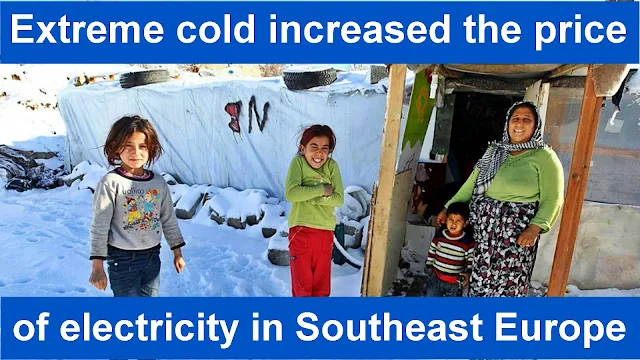Online Financial Advice is a blog where you find the latest news in business, and financial domain. Also from here you will learn good tips about managing your money, and new earning possibilities. Online Financial Advice is your daily source of fresh information that you need to become rich.
Extreme cold increased the price of electricity in Southeast Europe
Arctic cold and heavy snowfalls have left tens of thousands of households in southeastern Europe without electricity, while the rivers froze, yielded cables and power stations have been failures, reports Bloomberg.
From Greece to Hungary, hydroelectric production decreased due to temperatures that dropped below -20 degrees Celsius and, while portions of the Danube were completely covered by ice, according News.ro.
In Bulgaria, Romania and Serbia, residents of remote villages were evacuated because they were left without electricity or heat. Bulgaria has refused requests for emergency power supply from Greece and Turkey, following heavy snowfalls, said Tuesday the Bulgarian Minister of Energy, Temenuzka Petkova.
Authorities in Sofia were in turn rejected by Romania two days ago, while Greece has announced that it will stop electricity exports to Bulgaria from Wednesday noon.
"The market panics due to weather extremes. With all these feathers, people do not know what to expect, "said Tamas Migaly, energy trader at broker 42 Financial Services in Prague.
Energy prices jumped to unprecedented levels in Hungary, the spot price for immediate delivery climbed Tuesday to 200 euros per megawatt hour, showed Migaly.
Contracts in Serbia reached a record on Tuesday to about 150 euros per megawatt hour, said Milos Mladenovic, general manager of platform seepex in Belgrade. Ibex price of electricity market in Bulgaria has reached about 109.8 euros per megawatt hour.
According to MDA Weather Services, unusually cold weather will continue from Croatia to Turkey. Temperatures in the region are expected to reach next week on average -6.4 degrees Celsius, 6.8 degrees below average for the past 10 years, according to The Weather Company
About 23,000 households in Bulgaria were left without electricity, and the two largest ports in the country were closed due to difficult weather conditions. In Romania, about 14,000 households are isolated.
"The entire region is relatively dependent on hydroelectric plants, which produce far less as usual, while consumption increases," said Mladenovic.
Energy deficit in the region is amplified by shutting down some nuclear reactors. In Romania it was disconnected a 700 MW reactor of the Cernavoda plant after the storm damaged a power line.
Hungary, where several thermal plants had problems, plans to disconnect a reactor of the Paks plant for three days starting January 13.
In France, prices for electricity contracts with delivery next week rose to 99% on Tuesday and Wednesday 18%. In Hungary, energy prices with next day delivery of advanced Tuesday by 110%, to a record, according to data brokers.
